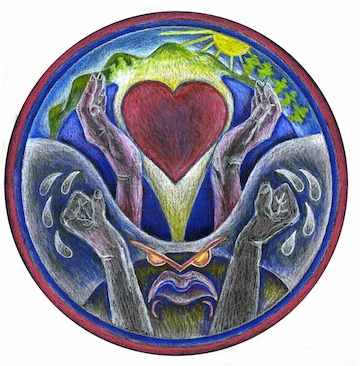Are You Addicted to Complaining As A Form of Control?
By Dr. Margaret PaulApril 11, 2016
Why do people complain? What is it they want or hope for when they complain? In this article, discover the answers to these questions, as well as what to do about it if you are addicted to complaining.
 Complaining is a way of life for some people. It was certainly a way of life for my mother. I don't remember a day going by without her complaining, endlessly. I don't think I ever heard a word of gratitude out of my mother's mouth. No matter how good things were, she would manage to find something wrong. No matter how perfect I was - and God knows I tried to be perfect! - she always found something wrong with me, as well as with my father.
Complaining is a way of life for some people. It was certainly a way of life for my mother. I don't remember a day going by without her complaining, endlessly. I don't think I ever heard a word of gratitude out of my mother's mouth. No matter how good things were, she would manage to find something wrong. No matter how perfect I was - and God knows I tried to be perfect! - she always found something wrong with me, as well as with my father.
Over the years of counseling others, I've noticed that some people start every session with a complaint. They can't seem to help it. Like my mother, they are addicted to complaining.
Why do people complain? What is it they want or hope for when they complain?
People who complain are generally people who have not done the emotional and spiritual work of developing a loving, compassionate inner adult self. They are operating as a wounded child in need of love, attention and compassion. Because they have not learned to give themselves the attention and compassion they need, they seek to get these needs met by others. Complaining is a way they have learned to attempt to get this. They use complaining as a form of control, hoping to guilt others into giving them the attention, caring and compassion they seek.
Complaining is a "pull" on other people. Energetically, complainers are pulling on others for caring and understanding because they have emotionally abandoned themselves. They are like demanding little children. The problem is that most people dislike being pulled on and demanded of. Most people don't want emotional responsibility for another person and will withdraw in the face of another's complaints.
This is what my father did. He withdrew. He shut down and he was emotionally unavailable to my mother as a way to protect himself from being controlled by her complaints. Of course, he didn't just do this in response to my mother. He had learned to withdraw as a child in response to his own mother's complaints and criticism. He entered the marriage ready to withdraw in the face of my mother's pull, while she entered the marriage ready to make my father emotionally responsible for her. A perfect match!
My father's withdrawal, of course, only served to exacerbate my mother's complaining, and she constantly complained about my father's lack of caring about her. Likewise, my mother's complaining served to exacerbate my father's already withdrawn way of being. This vicious circle started early and continued unabated for the 60 years of their marriage, until my mother died.
While my parents loved each other, their ability to express their love got buried beneath the dysfunctional system they created. Unfortunately, this is all too common in relationships. The most common relationship system I work with is where one partner is pulling - with complaints, anger, judgment and other forms of control - and the other is withdrawing.
A person addicted to complaining will not be able to stop complaining until he or she does the Inner Bonding work of developing a loving adult part of themselves capable of giving themselves the love, caring, understanding and compassion they need. As long as they believe that it is another's responsibility to be the adult for them and fill them with love, they will not take on this responsibility for themselves.
Our inner child - the feeling part of us - needs attention, approval and caring. If we don't learn to give this to ourselves, then this wounded child part of ourselves will either seek to get it from others, or learn to numb out with substance and process addictions, such as food, alcohol, drugs, TV, work, gambling and so on. If, as a child, a person saw others get attention through complaining - as my mother did with my grandmother - and if complaining worked for the child to get what he or she wanted, then it can become an addiction. Like all addictions, it may work for the moment, but it will never fill the deep inner need for love. Only we can fill this need for ourselves, by opening our hearts to our Source of love. Only we can do the Inner Bonding work of developing a loving adult capable of opening to the love of Spirit and bringing that love to the child within. People stop complaining when they learn to love themselves and fill themselves with love.
Join Dr. Margaret Paul for her 30-Day at-home Course: "Love Yourself: An Inner Bonding Experience to Heal Anxiety, Depression, Shame, Addictions and Relationships."
 Send this article to a friend
Send this article to a friend  Print this article
Print this article  Bookmarked 3 time(s)
Bookmarked 3 time(s)
| Related Articles |
|---|
| Addiction to Venting |
| Addiction to Talking |
| Addicted to Control |
Comments
| Author | Comment | Date |
|---|---|---|
| Join the Inner Bonding Community to add your comment to articles and see the comments of others... | ||

Daily Inspiration
Today, notice what you do to avoid painful feelings. Do you stay in your head instead of in your body? Do you keep your breath shallow? Do you get angry, withdrawn, judgmental? Do you use food, alcohol, drugs, sex, spending, gambling, work, TV? Today, compassionately embrace and learn from your feelings rather than avoiding them, and see how you end up feeling.
By Dr. Margaret Paul

 Share with Del.icio.us
Share with Del.icio.us Share with Digg
Share with Digg






